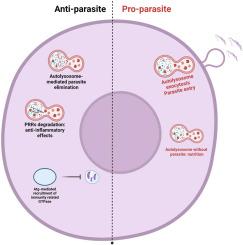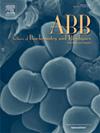宿主自噬在细胞内原生动物寄生虫病中的作用。
IF 3.8
3区 生物学
Q2 BIOCHEMISTRY & MOLECULAR BIOLOGY
引用次数: 0
摘要
细胞内原生动物寄生虫是疟疾、南美锥虫病、弓形虫病和利什曼病等重要人类疾病的病原体。在宿主细胞内,这些寄生虫为了自身的利益操纵宿主的新陈代谢和细胞内贩运,并不可避免地诱发多种应激反应机制。在这篇综述中,我们将讨论自噬这一应激反应机制,它既可以(i)被这些细胞内寄生虫用来获取营养,也可以(ii)限制寄生虫在宿主细胞内的增殖和存活。我们还讨论了自噬的免疫调节作用,它是减少炎症介导的损伤的一种策略,而炎症介导的损伤是这些寄生虫病病理生理学中的一个重要角色。最后,我们提出并讨论了几种已知的自噬调节剂,作为辅助疗法的可能药物。本文章由计算机程序翻译,如有差异,请以英文原文为准。

The role of host autophagy in intracellular protozoan parasites diseases
Intracellular protozoan parasites are the etiologic agents of important human diseases, like malaria, Chagas disease, toxoplasmosis, and leishmaniasis. Inside host cells, these parasites manipulate the host metabolism and intracellular trafficking for their own benefits and, inevitably, induce several stress response mechanisms. In this review, we discuss autophagy as a stress response mechanism that can be both (i) explored by these intracellular parasites to acquire nutrients and (ii) to restrict parasite proliferation and survival within host cells. We also discuss the immunomodulatory role of autophagy as a strategy to reduce inflammatory-mediated damage, an essential player in the pathophysiology of these parasitic diseases. At last, we propose and discuss several known autophagy modulators as possible pharmaceuticals for adjunctive therapies.
求助全文
通过发布文献求助,成功后即可免费获取论文全文。
去求助
来源期刊

Archives of biochemistry and biophysics
生物-生化与分子生物学
CiteScore
7.40
自引率
0.00%
发文量
245
审稿时长
26 days
期刊介绍:
Archives of Biochemistry and Biophysics publishes quality original articles and reviews in the developing areas of biochemistry and biophysics.
Research Areas Include:
• Enzyme and protein structure, function, regulation. Folding, turnover, and post-translational processing
• Biological oxidations, free radical reactions, redox signaling, oxygenases, P450 reactions
• Signal transduction, receptors, membrane transport, intracellular signals. Cellular and integrated metabolism.
 求助内容:
求助内容: 应助结果提醒方式:
应助结果提醒方式:


